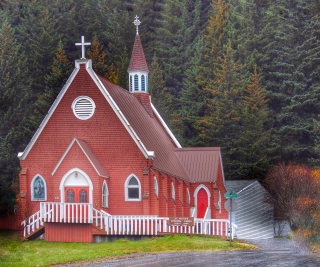 (Chapter 28 examined some of the environment in which Isaiah prophesied. This chapter further examines Isaiah).
(Chapter 28 examined some of the environment in which Isaiah prophesied. This chapter further examines Isaiah).
Chapter 7:11-16, of the Book of Isaiah, contains the prophet's main message when he said "The maiden is with child and she will call his name Immanuel." The Bible says this prophesy was fulfilled in Matthew 1:18-23.
In Isaiah 9:6, he prophesied that "Jesus would come as a baby."
Isaiah 53 is applied to Jesus several times in the New Testament, and the Book of Isaiah is quoted 85 times in the New Testament.
Found in Chapter 6, Isaiah, regarded as the Evangelical Prophet, was called to begin prophesying about 742BC. "Here I am, send me" was Isaiah's response after he saw God and the need for a prophet to the Israelites. Isaiah suffered bitter opposition, ridicule, and disbelief by the Israelites. Isaiah's sympathies were with the poor, not the upper classes. His speech was strong, vivid, and of the finest classical Hebrew.
The Book of Isaiah can be separated into five sections of prophesies:
-Chapters 1-25, against Judah and Jerusalem
-the reigns of King Josiah and King Jehoiakim
-after Jehoiakim's reign ended
-against foreign nations
-hope for Israel
Isaiah 53 says "He was wounded for our transgressions, He was crushed for our iniquities." This refers to the atonement of Jesus.
Verses in the Book of Isaiah that directly apply to Jesus include:
-6:1-2 - His message
-7:14-15 - the conception of Christ
-9:1-2 - His ministry
-9:6 - His name
-9:7 - His rule
-11:1-2 - His commission
-35:5-6 - His ministry
-42:1 - His name
-42:2-7 - His ministry
-50:4-5 - His message
-50:6 - His suffering
-52:13 - His resurrection
-52:14 - His suffering
-53 - His death
-53:2 - His commission
There are several other prophesies in Isaiah, but what about Isaiah himself? Isaiah is considered the greatest of the writing prophets. He enjoyed most of his influence under King Hezekiah. There are 25 Hebrew words in the Book of Isaiah that occur in no other prophetic writing.
Three themes Isaiah frequently used were references to the "holy mountains" of Jerusalem, the highway to Jerusalem, and the use of fire as punishment (when Isaiah used this theme he meant God's judgement).
Isaiah prophesied during the decline of Israel and the expansion of the Assyrian Empire, that occurred about 740BC to 727BC. He also prophesied the sins of Judah would result in its captivity by Babylon in 586BC. Isaiah 35:9 says God would rescue His people from BabylonIan captivity as He did from Egypt. The Israelites returned to Judah in 538BC/537BC.
The Book of Isaiah could be separated in this manner:
-Chapter 5:1-7 is the vineyard song about God's relationship with Israel
-Chapter 12:1-6 is a hymn of praise
-Chapters 13 through 23 contain the book's poetry and oracles
-Chapters 24 through 27 are an apocalyptic section that stresses the last days
-Chapter 28:23-29 is a wisdom poem
-Chapters 36 through 39 are the main prose of the book
-Chapter 38:10-20 is a hymn of praise
-Chapter 44:9-20 denounces idols
-Chapter 51:17 is about God's cup of wrath
-Chapter 63:3 is a picture of judgement
-Chapter 63:7-Chapter 64:12 is a national lament
The exodus from Egypt, the crossing of the Red Sea, the overthrow of Sodom and Gemorrah, Gideon's victory over Midian, and the Song of Moses (Deuteronomy 32), are all mentioned in the Book of Isaiah.
Other prophesies of Isaiah include:
-Chapter 9:7 says a king descended from David will rule in righteousness. This refers to Jesus.
-Chapter 40 focuses on the coming of Jesus. The Book of Isaiah says 36 times God is the Holy One of Israel.
-Chapter 40:8 says God directs us away from ourselves to Him for salvation.
-Chapter 42:6 says Jesus is a light to the Gentiles
-Chapter 60:22 says when the time is right, I, the Lord, will make it happen. This shows God is faithful and true.
-Jesus quoted Isaiah 61 in the synagogue at Nazareth. This is the Good News of salvation.
Discovered by Rabbi Simeon ben Azzai in Jerusalem, in the Talmud (the central text of Rabbinic Judaism, Jewish religious law, and Jewish theology) it is written King Manasseh killed Isaiah because he claimed, "I saw the Lord seated upon His throne." This was opposed to what Moses said, "No man may see God and live."
Isaiah spoke the tetragrammation (the four letter name of God, YHWH) and a cedar tree opened. Isaiah disappeared inside the tree. Manasseh ordered the tree sawn down. When the saw reached Isaiah's mouth he died. His punishment for having said, "I dwell in the midst of a people of unclean lips."
Known as the Mishnah, the Jerusalem Talmud, a Rabbinic collection of notes on the 2nd Century Jewish oral traditions, has Isaiah fleeing from Manasseh and hiding in a cedar tree. Unfortunately for Isaiah, the fringes of his garment hung out of the tree. The tree was sawn in half. So was Isaiah.
Rabbinic literature states Isaiah was the maternal grandfather of King Manasseh, the 14th King of Judah.
Sources:
Bible
biblestudytools.com
beliefnet.Com
britannica.Com
simplybible.com
Next Time: Chapter 30: Literary Criticisms Of David
Author Notes
Old Church In Seward, by alaskapat, selected to complement my posting.
|
|


